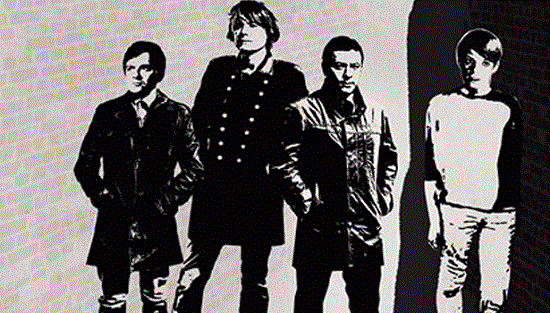I recall a conversation myself and a fellow Manic Street Preachers aficionado had when No Manifesto was first announced in 2006/7. Firstly, both of us were peeved at the title. Being uppity Manics fans we stated in our know-all capacity that the Manics had laid out a clear manifesto at their very origins: famously proposing that their debut album Generation Terrorists (1991) was the only one they would ever need to record, as it was going to sell sixteen million copies and lead to a sell-out show at Wembley Stadium. The band would then break up and disappear leaving the adoring masses weeping in the streets at the loss of rock ‘n’ roll’s saviours. Of course, like most manifestos, it failed to transpire. The public were not ready to take a bunch of Welsh, lipstick and leopard print wearing, slogan spouting, punk rock pretty boys to their collective hearts. Our second grievance (or at the very least my own) was that the filmmaker, Elizabeth Marcus, had begun production during the dullest period in the band’s history. What good was a vigorous rock documentary when the band in question had just released the mostly lifeless album Lifeblood (2004)?. The band were also in the midst of a career retrospective, with the hits collection Forever Delayed (2002), a b-sides and rarities compilation Lipstick Traces (2003), and a ten year anniversary edition of their monolithic 1994 album The Holy Bible. All this nostalgic activity made it obvious how plodding and uninspired some of Lifeblood really was (the album is dismissed in No Manifesto in less than a minute, with James Dean Bradfield calling it a "strange anomaly"). Archive footage of the bands heyday in army fatigues and balaclavas, screaming out the nihilistic anthem ‘Faster’ on Top Of The Pops would surely now show the band in state of decline; musically, physically, and aesthetically. The military attire having been replaced by loose khakis and designer brand shirts. The following years offered some decent solo offerings, but very little band activity. Lead singer and guitarist James Dean Bradfield’s solo debut The Great Western (2006) was well received and had genuine moments of greatness, whilst bassist Nicky Wire’s I Killed the Zeitgeist (2006), was a shabby punk-pop oddity. Although unbeknownst to fans and critics at the time, the Manic’s were building towards a triumphant critical and commercial rebirth that would begin with the release of Send Away the Tigers (2007). However, as it stood, No Manifesto was doomed to failure, and therefore to be hated by me.
After viewing the film, I wish I could go back in time and give my self-righteous self a good slap. Elizabeth Marcus has produced a cracking, if slightly uneven, fan film. It may not measure up to classic rock documentaries of the past, but it blows apart the pretensions of previous television documentaries on the band, which have tended to be sober reflections on their still missing guitarist, lyricist, and friend Richey Edwards. Though I would still argue that, despite the film’s title, the Manic Street Preachers have intuitively produced a solid career long manifesto with the aim of shining a light on various cultural figures, historical events, political dramas, and personal traumas. There are not many bands who can claim that promoting intellectualism for a mainstream audience is a vital part of their existence. This facet of fierce intelligence has continued throughout their career. As the years rolled on the meanings may have become more refined, but they were still there, nestled within the music and ready to illuminate the audience.
In No Manifesto the band mostly talk about their career, and muso stuff like guitar collections and drum kits. It’s fascinating to watch the band in the unglamourous surroundings of a Cardiff rehearsal studio and it’s obvious that they savour the environment of creativity. Their fans, culled from various nationalities, cutely comment on James, Nicky and Sean as individuals, as if they were proud aunts and uncles to three overachieving nephews. They construct the bands history, and debunk some Manic myths (Nicky Wire can actually play the bass really well!). The interviews also include some of the bands entourage; a roadie and a couple of their producers, but unfortunately the documentary fails to take in some of the bands more interesting associates. It would have been good to have author and columnist John Niven, actor Michael Shannon, the band’s official photographer Mitch Ikeda, biographer Simon Price, or music photographer Kevin Cummins, all confirmed Manic’s fans, lend some weight to the discussion of the band’s impact. Marcus does consult an extremely small number of American Manics fans, which at the very least brings to light a fairly obscure subculture of devotion to the band that has mostly gone unreported.
Focusing on a lacklustre period was an early criticism. However, conversing with the band when there is nothing for them to promote opens them up to more unguarded discussion, and offers some real moments, including a lovers tiff between James and Nicky in the recording studio, and the band’s drummer (and in my opinion the hero of No Manifesto) Sean Moore touting his gun collection and practising his aim at a shooting range. It all adds up to a unglamourous, yet also unpretentious encounter. Also, focusing on a more mature Manic Street Preachers, who are now accustomed to the media glare, means they provide honest, measured, and funny responses to the questions. Compare James Dean Bradfield’s twitchy interviews prior to Everything Must Go‘s release with his relaxed manner in No Manifesto.

A criticism that could be fired at No Manifesto is that it simply does not delve deep enough, or add up to much in the end. Though what a documentary that fully uncovers Manic’s culture would look like, and how long it would need to be, is difficult to fathom. The most definitive biography of the band, Simon Price’s comprehensive Everything: A Book About Manic Street Preachers (1999), runs past 300 pages and just covers the first five albums. An updated edition, taking in all twelve records, would possibly be as bulky as the real Holy Bible. Translated to an in-depth documentary, you’d be talking about years of footage. Also the film seems content to finish just as Richey Edward’s final testament, Journal for Plague Lovers (2009) is imminent. Their recording with seasoned producer Steve Albini is overlooked, and their return to critical good graces with Postcards from a Young Man (2010), Rewind the Film (2013), and Futurology (2014) is left out completely. Something of a shame considering they rediscovered their enthusiasm for rock music at this point.
As rock documentaries go, No Manifesto is certainly no Cocksucker Blues, Dig!, Some Kind Of Monster, or The Devil And Daniel Johnston. But, Manic Street Preachers have never been rock behemoths like The Rolling Stones or Metallica. They have never courted the sleazy shenanigans of The Dandy Warhols and The Brian Jonestown Massacre. They’ve never been an indie concern like Daniel Johnston. They have walked a line between mainstream and alternative, courteous at one instant and reactionary the next. Their style and music has been too schizophrenic for them to become megastars. What makes them stand apart has always been their intense connection with the fans, the emotional scope of the music, the intelligence and meaning behind the lyrics, and their political stance. No Manifesto perfectly illuminates those aspects. It’s far from a perfect documentary, but then Manic Street Preachers have always been far from a perfect band. That’s why we love them.
No Manifesto is out on DVD and Blu-ray now



